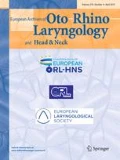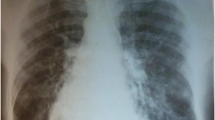Abstract
Primary ciliary dyskinesia (PCD) is a rare inherited disease with a prevalence of about 1:20,000. The underlying pathogenesis is disrupted ciliary function, which results in delayed mucus transportation leading to chronic inflammation, mainly in the upper and lower respiratory tract. Although the pathogenesis of the disease and its clinical presentation is somewhat understood, data regarding the prevalence of accompanying symptoms is limited, especially in the field of otorhinolaryngology. A total of 44 patients diagnosed with PCD answered a questionnaire regarding the diagnosis and clinical presentation of the disease, their medical history and clinical manifestations, and medical treatment in the field of otorhinolaryngology. The majority of participants (70%) had seen a physician more than 50 times before the diagnosis was made at an average age of 10.9 ± 14.4 years. As much as 59% of all patients had recurring problems at the paranasal sinuses and 69% of these patients needed corresponding surgical intervention. Even more patients (81%) suffered from recurring otitis media and, as a result, 78% of these patients underwent paracentesis with temporary tympanostomy tubes at least once at an average age of 9.5 ± 13.0 years. Otorhinolaryngologic symptoms, especially chronic otitis media and chronic rhinosinusitis, are frequently associated with PCD. Surgical intervention to treat these symptoms is common. The awareness of this disease should be raised, especially among ENT physicians, and surgical intervention should be indicated carefully.




Similar content being viewed by others
References
Fliegauf M, Benzing T, Omran H (2007) When cilia go bad: cilia defects and ciliopathies. Nat Rev Mol Cell Biol 8(11):880–893
Chapman KR, Allen LJ, Romet TT (1990) Pulmonary function in normal subjects following exercise at cold ambient temperatures. Eur J Appl Physiol Occup Physiol 60(3):228–232
Satir P, Sleigh MA (1990) The physiology of cilia and mucociliary interactions. Annu Rev Physiol 52:137–155
Nuutinen J, Karja J, Karjalainen P (1983) Measurement of mucociliary function of the eustachian tube. Arch Otolaryngol 109(10):669–672
Hilfinger A, Chattopadhyay AK, Julicher F (2009) Nonlinear dynamics of cilia and flagella. Phys Rev E Stat Nonlin Soft Matter Phys 79(5 Pt 1):051918
O’Callaghan C, Chilvers M, Hogg C, Bush A, Lucas J (2007) Diagnosing primary ciliary dyskinesia. Thorax 62(8):656–657
Barbato A, Frischer T, Kuehni CE, Snijders D, Azevedo I, Baktai G, Bartoloni L, Eber E, Escribano A, Haarman E, Hesselmar B, Hogg C, Jorissen M, Lucas J, Nielsen KG, O’Callaghan C, Omran H, Pohunek P, Strippoli MP, Bush A (2009) Primary ciliary dyskinesia: a consensus statement on diagnostic and treatment approaches in children. Eur Respir J 34(6):1264–1276
Katsuhara K, Kawamoto S, Wakabayashi T, Belsky JL (1972) Situs inversus totalis and Kartagener’s syndrome in a Japanese population. Chest 61(1):56–61
Schrott-Fischer A, Rieger G, Morass B, Bitsche M, Horak E, Riechelmann H, Gluckert R (2008) Diagnostics of primary ciliary dyskinesia. Laryngorhinootologie 87(11):809–820 (quiz 821–825)
Carlen B, Stenram U (2005) Primary ciliary dyskinesia: a review. Ultrastruct Pathol 29(3–4):217–220
Roomans GM, Ivanovs A, Shebani EB, Johannesson M (2006) Transmission electron microscopy in the diagnosis of primary ciliary dyskinesia. Ups J Med Sci 111(1):155–168
Fliegauf M, Olbrich H, Horvath J, Wildhaber JH, Zariwala MA, Kennedy M, Knowles MR, Omran H (2005) Mislocalization of DNAH5 and DNAH9 in respiratory cells from patients with primary ciliary dyskinesia. Am J Respir Crit Care Med 171(12):1343–1349
Santamaria F, De Stefano S, Montella S, Barbarano F, Iacotucci P, Ciccarelli R, Sofia M, Maniscalco M (2008) Nasal nitric oxide assessment in primary ciliary dyskinesia using aspiration, exhalation, and humming. Med Sci Monit 14(2):CR80–CR85
Zariwala MA, Knowles MR, Omran H (2007) Genetic defects in ciliary structure and function. Annu Rev Physiol 69:423–450
Noone PG, Leigh MW, Sannuti A, Minnix SL, Carson JL, Hazucha M, Zariwala MA, Knowles MR (2004) Primary ciliary dyskinesia: diagnostic and phenotypic features. Am J Respir Crit Care Med 169(4):459–467
Ernstson S, Afzelius BA, Mossberg B (1984) Otologic manifestations of the immotile-cilia syndrome. Acta Otolaryngol 97(1–2):83–92
Coren ME, Meeks M, Morrison I, Buchdahl RM, Bush A (2002) Primary ciliary dyskinesia: age at diagnosis and symptom history. Acta Paediatr 91(6):667–669
R-Development-Core-Team (2010) R: A language and environment for statistical computing. R Foundation for Statistical Computing, Vienna, Austria
Campbell RG, Birman CS, Morgan L (2009) Management of otitis media with effusion in children with primary ciliary dyskinesia: a literature review. Int J Pediatr Otorhinolaryngol 73(12):1630–1638
Lesic I, Maurer E, Strippoli MP, Kuehni CE, Barbato A, Frischer T (2009) Primary ciliary dyskinesia (Pcd) in Austria. Wien Klin Wochenschr 121(19–20):616–622
Storm van’s Gravesande K, Omran H (2005) Primary ciliary dyskinesia: clinical presentation diagnosis and genetics. Ann Med 37(6):439–449
Stannard W, O’Callaghan C (2006) Ciliary function and the role of cilia in clearance. J Aerosol Med 19(1):110–115
Pedersen M, Mygind N (1982) Rhinitis, sinusitis and otitis media in Kartagener’s syndrome (primary ciliary dyskinesia). Clin Otolaryngol Allied Sci 7(6):373–380
Mygind N, Pedersen M (1983) Nose-, sinus- and ear-symptoms in 27 patients with primary ciliary dyskinesia. Eur J Respir Dis Suppl 127:96–101
Paradise JL, Feldman HM, Campbell TF, Dollaghan CA, Colborn DK, Bernard BS, Rockette HE, Janosky JE, Pitcairn DL, Sabo DL, Kurs-Lasky M, Smith CG (2001) Effect of early or delayed insertion of tympanostomy tubes for persistent otitis media on developmental outcomes at the age of three years. N Engl J Med 344(16):1179–1187
Majithia A, Fong J, Hariri M, Harcourt J (2005) Hearing outcomes in children with primary ciliary dyskinesia—a longitudinal study. Int J Pediatr Otorhinolaryngol 69(8):1061–1064
van der Baan S (1991) Primary ciliary dyskinesia and the middle ear. Laryngoscope 101(7 Pt 1):751–754
Turner JA, Corkey CW, Lee JY, Levison H, Sturgess J (1981) Clinical expressions of immotile cilia syndrome. Pediatrics 67(6):805–810
Hadfield PJ, Rowe-Jones JM, Bush A, Mackay IS (1997) Treatment of otitis media with effusion in children with primary ciliary dyskinesia. Clin Otolaryngol Allied Sci 22(4):302–306
Baroody FM (2007) Mucociliary transport in chronic rhinosinusitis. Clin Allergy Immunol 20:103–119
Bush A, Chodhari R, Collins N, Copeland F, Hall P, Harcourt J, Hariri M, Hogg C, Lucas J, Mitchison HM, O’Callaghan C, Phillips G (2007) Primary ciliary dyskinesia: current state of the art. Arch Dis Child 92(12):1136–1140
Barghouth G, Prior JO, Lepori D, Duvoisin B, Schnyder P, Gudinchet F (2002) Paranasal sinuses in children: size evaluation of maxillary sphenoid, and frontal sinuses by magnetic resonance imaging and proposal of volume index percentile curves. Eur Radiol 12(6):1451–1458
Rollin M, Seymour K, Hariri M, Harcourt J (2009) Rhinosinusitis symptomatology and absence of polyposis in children with primary ciliary dyskinesia. Rhinology 47(1):75–78
Parsons DS, Greene BA (1993) A treatment for primary ciliary dyskinesia: efficacy of functional endoscopic sinus surgery. Laryngoscope 103(11 Pt 1):1269–1272
Wei YX, Xing FH, Miao XT, Liu XC, Zhang X, Lin J, Sun YL, Han DM (2007) Clinical features of primary ciliary dyskinesia. Zhonghua Er Bi Yan Hou Tou Jing Wai Ke Za Zhi 42(3):195–198
Conflict of interest
There is no conflict of interest.
Author information
Authors and Affiliations
Corresponding author
Rights and permissions
About this article
Cite this article
Sommer, J.U., Schäfer, K., Omran, H. et al. ENT manifestations in patients with primary ciliary dyskinesia: prevalence and significance of otorhinolaryngologic co-morbidities. Eur Arch Otorhinolaryngol 268, 383–388 (2011). https://doi.org/10.1007/s00405-010-1341-9
Received:
Accepted:
Published:
Issue Date:
DOI: https://doi.org/10.1007/s00405-010-1341-9




